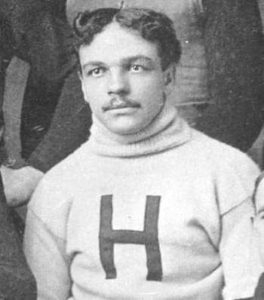
William H. Lewis, 1892
On this date, we mark the birth of William H. Lewis, born in 1868. He was a Black lawyer and American football player.
Born to slave parents in Berkley, Virginia, William Henry Lewis worked to pay for his education at Virginia Normal Institute (now Virginia State University). He later attended Amherst College in Massachusetts. Excelling as an orator and athlete, Lewis was one of the first Black men to play collegiate football, serving as team captain in 1890 and 1891. He met his future wife (Elizabeth Baker) at his graduation.
Lewis continued to play football at Harvard Law School, earning consecutive selections to Walter Camp’s newly created All-American team in 1892 and 1893. William Lewis worked to combat racism and discrimination. After he was refused a haircut at a local barbershop, he pressed the case to the state legislature. This resulted in the law broadening the prohibition of discrimination in public businesses.
After graduation in 1895, he worked as an attorney in Boston. Lewis participated in local politics and was elected to the Cambridge Common Council for three years.
In 1903, Theodore Roosevelt appointed Lewis to the post of the assistant district attorney of Boston. His involvement at a July National Negro Business League meeting ended up in a small public disturbance that drew ire from liberal Black Americans at the time. Lewis testified against many Blacks arrested that day, including William Monroe Trotter and his sister. Nevertheless, Lewis continued with national recognition of his abilities. 1911, President Taft appointed him assistant attorney general, the first African American to get a sub-cabinet position.
A year later, he was among the first three Blacks accepted to the American Bar Association (ABA). During the 1920s, he was active in Republican politics while practicing law and defending unpopular cases such as bootlegging, corruption, and racial discrimination. After his wife died in 1943, William Lewis moved back to Boston, where he died in 1949.
Black Leaders of the Nineteenth Century.
Edited by Leon Litwack and August Meier
Copyright 1998, University of Illinois Press
ISBN 0-252-06213-2